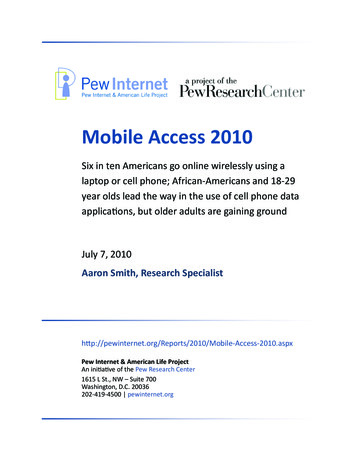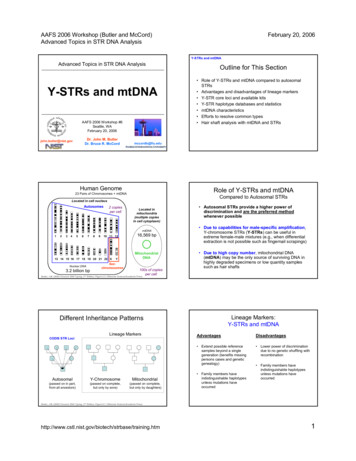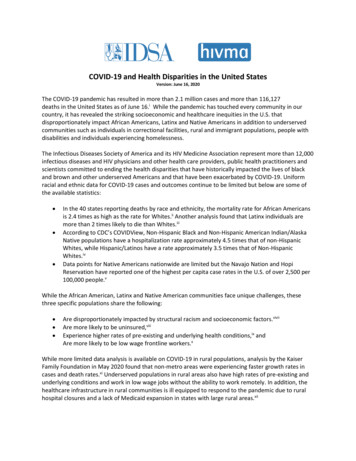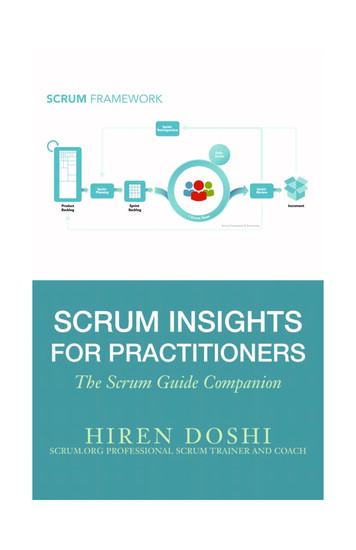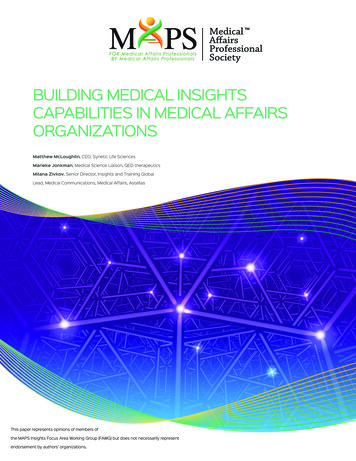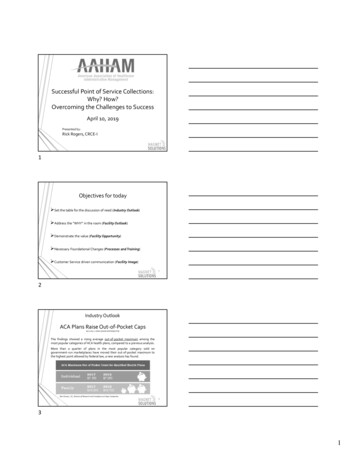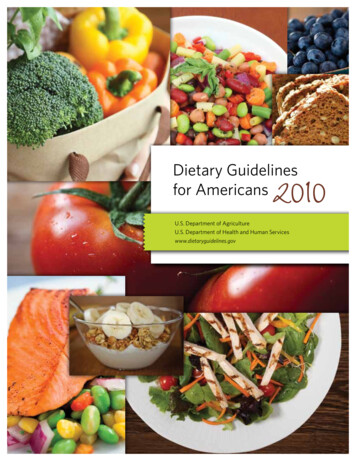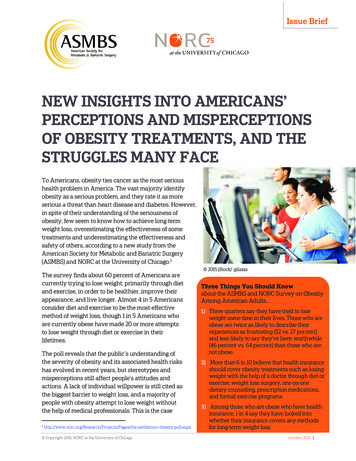
Transcription
Issue BriefNEW INSIGHTS INTO AMERICANS’PERCEPTIONS AND MISPERCEPTIONSOF OBESITY TREATMENTS, AND THESTRUGGLES MANY FACETo Americans, obesity ties cancer as the most serioushealth problem in America. The vast majority identifyobesity as a serious problem, and they rate it as moreserious a threat than heart disease and diabetes. However,in spite of their understanding of the seriousness ofobesity, few seem to know how to achieve long-termweight loss, overestimating the effectiveness of sometreatments and underestimating the effectiveness andsafety of others, according to a new study from theAmerican Society for Metabolic and Bariatric Surgery(ASMBS) and NORC at the University of Chicago. 1The survey finds about 60 percent of Americans arecurrently trying to lose weight, primarily through dietand exercise, in order to be healthier, improve theirappearance, and live longer. Almost 4 in 5 Americansconsider diet and exercise to be the most effectivemethod of weight loss, though 1 in 5 Americans whoare currently obese have made 20 or more attemptsto lose weight through diet or exercise in theirlifetimes.The poll reveals that the public’s understanding ofthe severity of obesity and its associated health riskshas evolved in recent years, but stereotypes andmisperceptions still affect people's attitudes andactions. A lack of individual willpower is still cited asthe biggest barrier to weight loss, and a majority ofpeople with obesity attempt to lose weight withoutthe help of medical professionals. This is the he-asmbsnorc-obesity-poll.aspx Copyright 2016. NORC at the University of Chicago 2015 iStock/ gilaxiaThree Things You Should Knowabout the ASMBS and NORC Survey on ObesityAmong American Adults 1) Three quarters say they have tried to loseweight some time in their lives. Those who areobese are twice as likely to describe theirexperiences as frustrating (52 vs. 27 percent)and less likely to say they've been worthwhile(46 percent vs. 64 percent) than those who arenot obese.2) More than 6 in 10 believe that health insuranceshould cover obesity treatments such as losingweight with the help of a doctor through diet orexercise, weight loss surgery, one-on-onedietary counseling, prescription medications,and formal exercise programs.3) Among those who are obese who have healthinsurance, 1 in 4 say they have looked intowhether their insurance covers any methodsfor long-term weight loss.October 2016 1
NEW INSIGHTS INTO AMERICANS’ PERCEPTIONS AND MISPERCEPTIONS OF OBESITY TREATMENTS, AND THE STRUGGLES MANY FACEdespite widespread public knowledge of the high risk of premature death and other serious healthconditions, including heart disease and diabetes, which are associated with obesity.According to the Centers for Disease Control and Prevention (CDC), from 2011-2014, 37 percent of U.S.adults and 17 percent of youth are obese. 2 The high prevalence of obesity and the increased risk itposes for a number of chronic health conditions, including heart disease, stroke, type 2 diabetes, andcertain types of cancer, have a high economic impact: the annual medical cost of obesity is estimatedto be 149.4 billion. 3The obesity epidemic in America has garnered attention not only from policymakers and the medicaland public health communities but also from the popular press. Much of this media coverage hasfocused on diet and exercise as the main solutions available to address the obesity epidemic. Whileencouraging a healthy lifestyle that includes good nutrition and regular physical activity is essential topreventing childhood obesity and promoting Americans’ overall health, diet and exercise alone areoften ineffective as methods for adults who have obesity to achieve long-term weight loss. 4 Moreover,television programs and popular magazines often promote crash diets and extreme exercise regimes,which are unhealthy, unrealistic, and unsustainable for long-term weight loss. Medical treatments forobesity, such as prescription medications and weight loss surgery, have received less media coverage,and Americans’ perceptions of such medical treatments are unclear. 5,6The poll finds Americans, in fact, overestimate the effectiveness of diet and exercise alone forlong-term weight loss, and tend to underestimate both the safety and effectiveness of medical andsurgical treatments.A poll by The Associated Press-NORC Center for Public Affairs Research in 2013 explored the public’sopinions on obesity and obesity-related health issues in the United States. Key findings includedAmericans’ knowledge of the health impacts of obesity and their support for policies to preventobesity. This new poll builds on those original findings by focusing on individuals’ personalexperiences with weight loss, their perceptions of the safety and effectiveness of different methods forweight loss, and their support for insurance coverage for these methods.The new poll shows that three-quarters of Americans have tried to lose weight at some time in theirlives, and nearly as many (60 percent) are currently trying to lose weight. Among all Americans, dietand exercise are by far the most popular weight loss methods; 9 out of 10 adults who have tried to loseweight have attempted to do so on their own through diet and exercise. Yet about half of those whohave ever used diet or exercise report having made at least 5 different attempts to lose weight, and 20percent of Americans who have obesity have made 20 or more attempts to lose weight through diet orexercise.Despite these limitations in producing sustained weight loss, losing weight on one’s own through dietand exercise is still perceived to be the most effective long-term weight-loss method (78 percent),higher than weight-loss surgery (60 percent) or prescription medications (25 percent). People withobesity place less faith in diet and exercise than those who are not obese (70 percent vs. 83 percent)but have similar views on the effectiveness of weight-loss surgery and prescription ociologicalforum.pdf?origin publication detail23 Copyright 2016. NORC at the University of ChicagoOctober 2016 2
NEW INSIGHTS INTO AMERICANS’ PERCEPTIONS AND MISPERCEPTIONS OF OBESITY TREATMENTS, AND THE STRUGGLES MANY FACEWhen it comes to American’s perceptions of safety, losing weight with the help of a doctor throughdiet or exercise rates the highest (90 percent), while prescription medications (15 percent) and dietarysupplements (16 percent) rate the lowest. As for the risks of weight-loss surgery, Americans aredivided, with one-third each believing it to be safe, unsafe, or neither safe nor unsafe. A majority ofAmericans (68 percent), however, believe that living with obesity is riskier than having weight-losssurgery. Still, only 1 in 4 Americans with obesity report ever having looked into whether or not theirhealth insurance covers treatments for long-term weight loss, and just a quarter say they have everconsidered having weight-loss surgery. Only 3 percent of Americans report having some form ofweight-loss surgery.Experiences with weight loss and perceptions of barriers to weight loss vary across demographicgroups. For example, 2 in 10 African Americans and the same number of Hispanics say “easy”describes their experiences trying to lose weight compared with just 1 in 10 whites. African Americansare also less likely than whites to say that barriers to weight loss include a lack of willpower (64percent vs. 77 percent) and spending too much time in front of TV, video games, or computer screens(52 percent vs. 66 percent). And, compared to whites, Hispanics are more likely to say that methods forlosing weight are too expensive (59 percent vs. 47 percent).Men and women also perceive barriers to weight loss differently. Compared to men, women are lesslikely to say that barriers to weight loss include spending too much time in front of TV, video games, orcomputer screens (58 percent vs. 69 percent). On the other hand, women are more likely than men tosay methods for losing weight are too expensive, that there are not enough safe or low cost options tobe physically active, being genetically predisposed to overweight or obesity, that weight loss methodsare not covered by health insurance, and not getting enough support from family or friends arebarriers to weight loss. Women—regardless of weight— are more likely than men to have made weightloss attempts and are more likely to have ever used each of many weight loss methods asked about onthe survey. In particular, women are three times as likely as men to report they have consideredweight-loss surgery (18 percent vs. 6 percent). And, women express higher support than men for healthinsurance coverage of most medical methods, including losing weight with the help of a doctor, dietarycounseling, and weight-loss surgery.The nationally-representative survey of 1,509 adults included oversamples of African Americans andHispanics. It was funded by ASMBS and used AmeriSpeak , the probability-based panel of NORC atthe University of Chicago. Interviews were conducted between August 11 and September 21, 2016,online and using landlines and cell phones.Other key findings from the poll include: Americans who are obese are more likely to describe their experiences trying to lose weight as“frustrating” (52 percent), and less likely to say they have been “worthwhile” (46 percent) thanthose who are not obese (27 percent and 64 percent, respectively). Overall, a majority of Americans say they have complete or quite a bit of control of their weight (58percent), 30 percent say they have a moderate amount of control, and 12 percent say they haveonly a little or no control. However, those with obesity perceive the amount of control they haveover their weight differently from those who are not obese. Americans who have tried to lose weight report the biggest barrier to doing so is a lack ofwillpower, with 34 percent citing it as a major barrier and 41 percent as a minor barrier. This is Copyright 2016. NORC at the University of ChicagoOctober 2016 3
NEW INSIGHTS INTO AMERICANS’ PERCEPTIONS AND MISPERCEPTIONS OF OBESITY TREATMENTS, AND THE STRUGGLES MANY FACEfollowed closely by the number saying that unhealthy foods are too convenient, affordable, oravailable, with 38 percent citing it as a major barrier and 35 percent as a minor barrier. Majorities consider one-on-one dietary counseling, weight loss surgery, and formal weight-lossprograms to be effective weight-loss methods, though not as effective as diet and exercise. But,fewer than 3 in 10 consider dietary supplements, prescription medications, meal replacements,and other treatments or methods effective. Nine in 10 Americans consider losing weight on your own or with the help of your doctor throughdiet or exercise, one-on-one dietary counseling with a dietician, and formal exercise programs to besafe, though fewer think formal weight loss programs (66 percent) or meal replacements (40percent) are safe. Prescription medications and dietary supplements both receive low ratings for safety, with onlyabout 15 percent of Americans rating these methods as very safe or safe. Forty-one percent of those with obesity currently meet the criteria to be a candidate forweight- loss surgery. Yet, just 1 in 3 eligible adults have considered it, and even fewer have beentold by a doctor or health professional that they are a candidate, suggesting a disconnect betweenthe options available to adults who have severe obesity and the options presented to them.FEW AMERICANS SAY TRYING TO LOSE WEIGHT IS EASY, BUTAMERICANS WITH OBESITY ARE FAR MORE LIKELY TO PERCEIVEWEIGHT-LOSS ATTEMPTS NEGATIVELY.Three-quarters of Americans say they have tried to lose weight some time in their lives, and nearly asmany (60 percent) are currently trying to lose weight. Women and adults who are obese are morelikely to have made weight loss attempts.Few Americans (13 percent) describe their experiences trying to lose weight as easy, and those whoare obese are half as likely as those who are not to describe their weight loss as easy. Two in 10 AfricanAmericans and the same number of Hispanics say “easy” describes their experience, compared withjust 1 in 10 whites.Indeed, nearly all of those who are not obese report being at least moderately successful at losingweight (87 percent) and keeping it off (87 percent), while those who are obese report less success withlosing weight (66 percent) and maintaining weight loss (58 percent). Americans who are obese aremore likely to describe their experiences trying to lose weight as frustrating (52 percent), and lesslikely to say they have been worthwhile (46 percent) than those who are not obese (27 percent and 64percent, respectively).MOST AMERICANS HAVE TRIED TO LOSE WEIGHT, BUT THOSE WITHOBESITY ARE FAR LESS LIKELY TO FEEL LIKE THEY HAVE CONTROLOVER THEIR WEIGHT.Three-quarters of American adults have tried to lose weight at some point in their lives, an increasefrom three years ago when 64 percent had tried to lose weight. Almost as many (60 percent) arecurrently trying to lose weight, which has also increased since 2013 (51 percent). rveys lus-AARP-res-gen.pdf Copyright 2016. NORC at the University of ChicagoOctober 2016 4
NEW INSIGHTS INTO AMERICANS’ PERCEPTIONS AND MISPERCEPTIONS OF OBESITY TREATMENTS, AND THE STRUGGLES MANY FACEThose who are trying to lose weight do so for a variety of reasons, with improvements in overallhealth, physical appearance, living longer, and being more active as primary drivers. The motivationsfor weight loss differ substantially between those who are and are not obese, by gender, and by raceand ethnicity.Americans with obesity are more likely than those who are not to cite health conditions and not beingable to do the things they want to do as reasons they tried to lose weight.Percent major reason forwanting to lose weightObesity 11I developed ahealthcondition likediabetes orhigh bloodpressureI wantedto livelonger77I wanted toPeople madeimprove mycommentsappearanceabout myor the way myweightclothes fitObese4I wasdiscriminatedagainstbecauseof my weight9My weightpreventedme fromdoing thethings Iwanted to doI wanted to I wanted to beimprove mymoreoverall healthphysicallyactiveNot obesePercent major reason forwanting to lose weightGender10090807060504030201007369564820 22I developed ahealthcondition likediabetes orhigh bloodpressure13I wantedto live longer8I wanted toPeople madeimprove mycommentsappearance orabout mythe way myweightclothes fitWomen Copyright 2016. NORC at the University of Chicago665457 5522 1866I wasMy weightdiscriminatedpreventedagainstme from doingbecausethe things Iof my weight wanted to doI wanted toimprove myoverallhealthI wanted to bemorephysicallyactiveMenOctober 2016 5
NEW INSIGHTS INTO AMERICANS’ PERCEPTIONS AND MISPERCEPTIONS OF OBESITY TREATMENTS, AND THE STRUGGLES MANY FACERace and ethnicityPercent major reason for wanting tolose weight10090807060504030201006861485474 7760 6433221917I developed ahealthcondition likediabetes orhigh bloodpressureI wanted tolive longer1423 25129I wanted toPeople madeimprove mycommentsappearance orabout mythe way myweightclothes fitAfrican American6659 6354187 4I wasMy weightdiscriminated prevented meagainstfrom doing thebecausethings Iof my weight wanted to doHispanicI wanted toimprovemy overallhealthI wanted tobe morephysicallyactiveWhiteQuestion: Was each of the following a major reason, minor reason, or not a reason at all that you decided to try to loseweight?Overall, a majority of American adults say they have complete or quite a bit of control of their weight(58 percent), 30 percent say they have a moderate amount of control, and 12 percent say they haveonly a little or no control. In line with the findings showing that those with obesity are more likely tofeel frustrated by weight-loss attempts, they are also less likely to feel they have control over theirweight compared to those who are not obese.Americans with obesity feel less in control of their weight than those who are not obese.Percent of American uite a bit of controlOverallModerate amount of controlObeseOnly a little/no control at allNot obeseQuestion: When it comes to managing your weight, how much control do you feel like you have over your weight? Copyright 2016. NORC at the University of ChicagoOctober 2016 6
NEW INSIGHTS INTO AMERICANS’ PERCEPTIONS AND MISPERCEPTIONS OF OBESITY TREATMENTS, AND THE STRUGGLES MANY FACEAMERICANS CITE A LACK OF WILLPOWER AND EASY ACCESS TOUNHEALTHY FOODS AS THE TWO BIGGEST BARRIERS TO WEIGHT LOSS.Americans who have tried to lose weight report the biggest barrier is a lack of willpower, with 34percent citing it as a major barrier and 41 percent as a minor barrier to their attempts to lose weight.This is followed closely by the number who say that unhealthy foods are too convenient, affordable, oravailable, with 38 percent citing it as a major barrier and 35 percent as a minor barrier.Compared to Americans who are not obese, those who are obese are more likely to cite severalbarriers to weight loss.Perceived barriers to weight loss differ for Americans who are obese and those who are not obese.75Lack of willpower7173Unhealthy foods too convenient, affordable, available816663Too much time in front of TV/video games/computer705759Healthy foods not convenient, affordable, available5349Methods for losing weight are too expensive42364942Genetically predisposed to be overweight/obese562940Methods for losing weight not covered by insurance513031Don't have enough information on how to manage weight2325Not getting enough support from family/friends23301701020383616Not getting enough support from spouse/partner676138Not enough safe/low cost places to be physically active8130405060708090Percent of American Adults Rating as a Major or Minor Barrier to Weight LossOverallObeseNot obeseQuestion: Is each of the following a major barrier, a minor barrier, or not a barrier at all to your attempts to lose weight?Perceived barriers to weight loss also vary between men and women and those from different racialand ethnic groups. Compared to men, women are less likely to say that barriers to weight loss includespending too much time in front of TV, video games, or computer screens (58 percent vs. 69 percent).On the other hand, women are more likely than men to cite as barriers that methods for losing weight Copyright 2016. NORC at the University of ChicagoOctober 2016 7
NEW INSIGHTS INTO AMERICANS’ PERCEPTIONS AND MISPERCEPTIONS OF OBESITY TREATMENTS, AND THE STRUGGLES MANY FACEare too expensive (57 percent vs. 38 percent), there are not enough safe or low cost options to bephysically active (46 percent vs. 37 percent), being genetically predisposed to overweight or obesity(45 percent vs. 37 percent), weight loss methods are not covered by health insurance (45 percent vs. 33percent), and not getting enough support from family or friends (29 percent vs. 21 percent).Compared to whites, African Americans are less likely to say that barriers to weight loss include a lackof willpower (64 percent vs. 77 percent) and spending too much time in front of TV, video games, orcomputer screens (52 percent vs. 65 percent).Additionally, compared to whites, Hispanics are more likely to say that methods for losing weight aretoo expensive (59 percent vs. 47 percent).MANY AMERICANS OVERESTIMATE THE EFFECTIVENESS OF DIET ANDEXERCISE FOR ACHIEVING SIGNIFICANT, LONG-TERM WEIGHT LOSS.Americans who are obese and women, regardless of weight, use weight-loss methods at similar rates,and are more likely to have ever used each of many weight-loss methods asked about on the surveycompared to people who are not obese or men.Among all Americans, diet and exercise are by far the most popular weight-loss methods: 9 out of 10adults who have tried to lose weight have attempted to do so on their own through diet and exercise.Yet, about half of those who have ever used diet or exercise methods to lose weight report having doneso at least 5 different times throughout their lives, and 20 percent of Americans who are obese havemade 20 or more attempts to lose weight through diet or exercise methods, suggesting that thesemethods are not effective for long-term weight loss. 8Despite its limitations in producing long-term weight loss, losing weight on one’s own through diet andexercise is perceived to be the most effective long-term weight-loss method, with 78 percent saying itis very effective or effective. Majorities also consider formal exercise programs, losing weight with thehelp of your doctor through diet or exercise, one-on-one dietary counseling, weight loss surgery, andformal weight loss programs to be effective methods, while fewer than 3 in 10 consider dietarysupplements, prescription medications, meal replacements, and other treatments or methods effective.People with obesity place less faith in diet and exercise than those who are not obese (70 percent vs.83 percent), but have similar views on the effectiveness of weight-loss surgery and prescriptionmedications.Includes losing weight on your own or with the help of a doctor through diet and exercise, one-on-one dietary counseling, formal exerciseprograms, formal weight loss programs, and the use of meal replacements.8 Copyright 2016. NORC at the University of ChicagoOctober 2016 8
NEW INSIGHTS INTO AMERICANS’ PERCEPTIONS AND MISPERCEPTIONS OF OBESITY TREATMENTS, AND THE STRUGGLES MANY FACEDiet and exercise are the most popular weight loss methods for Americans.Percent who have ever tried 9597959695Losing weight on yourown through diet orexercise36Meal replacementssuch as Slimfastor Ensure4330432630Losing weight with thehelp of your doctorthrough diet or exercise1942332527Dietary supplementssuch as Herbalife,Ephedrine, or Dexatrim183419Formal weight loss programs,such as Weight Watchers,Jenny Craig, Nutrisystem,LA Weight Loss, or a hospitalbased program253518341421Formal exercise programswith a personal trainer,physical therapist, oroccupational therapist18171211763Weight loss surgerysuch as gastric bypassor gastric sleeve surgery342421093014146Prescription medicationsuch as Saxenda,Qsymia, or Contrave252113Other treatments ormethods such as hypnosis,acupuncture, churchprograms, or in-personor online support groups252616One-on-onedietary counselingwith a eNot obeseWomenMenQuestion: Please check all methods you are currently using or have tried to use in the past to lose weight. Copyright 2016. NORC at the University of ChicagoOctober 2016 9
NEW INSIGHTS INTO AMERICANS’ PERCEPTIONS AND MISPERCEPTIONS OF OBESITY TREATMENTS, AND THE STRUGGLES MANY FACEMANY AMERICANS SEE RISKS IN TREATMENTS THAT GO BEYONDTRADITIONAL DIET AND EXERCISE.Many adults believe most forms of diet and exercise are low-risk whether or not they are supervisedby a doctor or other health provider. Nine in 10 Americans consider losing weight on your own or withthe help of your doctor through diet or exercise, one-on-one dietary counseling with a dietician, orformal exercise programs to be safe, though fewer think formal weight loss programs (66 percent) ormeal replacements (40 percent) are safe.Americans are even less confident about the safety of methods other than traditional diet andexercise. When it comes to weight loss surgery, Americans are divided, with one-third each believing itto be safe, unsafe, or neither safe nor unsafe.Prescription medications and dietary supplements both receive low ratings for safety, with only about15 percent of Americans rating these methods as very safe or safe. Slightly more people with obesity,however, say prescription medications are safe (22 percent) compared to those who are not obese (12percent).PercentAmericans say diet and exercise are safe ways to lose weight, while methods like surgery andprescription medication are perceived as more risky.100908070605040302010090874931721032152Diet and exercise with the One-on-one counseling withhelp of your doctora dieticianSafe2937Weight loss surgeryNeither safe nor unsafePrescription medicationUnsafeQuestion: Even if you’ve never used it, please rate how safe you think each method is for significant, long-term weight loss?[Losing weight with the help of your doctor through diet or exercise] [One-on-one dietary counseling with a dietician][Weight loss surgery such as gastric bypass or gastric sleeve surgery] [Prescription medication such as Saxenda, Qsymia,or Contrave]A MAJORITY OF AMERICANS BELIEVE THAT TREATMENTS FOR WEIGHTLOSS ADMINISTERED BY A DOCTOR OR HEALTH PROVIDER SHOULD BECOVERED BY HEALTH INSURANCE.Many Americans believe health insurance should cover losing weight with the help of a doctorthrough diet or exercise (78 percent), weight loss surgery (75 percent), one-on-one dietary counseling(73 percent), prescription medications (61 percent), or formal exercise programs (60 percent). Yet, evenamong those with obesity, 35 percent have not involved medical professionals for help losing weight.Americans with obesity are more likely than those who are not obese to favor insurance coverage forall medical weight loss methods. Those who are overweight or obese tend to be more supportive than Copyright 2016. NORC at the University of ChicagoOctober 2016 10
NEW INSIGHTS INTO AMERICANS’ PERCEPTIONS AND MISPERCEPTIONS OF OBESITY TREATMENTS, AND THE STRUGGLES MANY FACEthose whose weight is “normal” or underweight of insurance coverage for methods centered on dietand exercise, such as losing weight with the help of a doctor through diet or exercise and formalexercise programs.Women express higher support than men for health insurance coverage for most medical methods,including losing weight with the help of a doctor, dietary counseling, and weight-loss surgery.Democrats are more likely than Republicans to believe all medical methods should be covered.Nine in 10 Americans with obesity say they have health insurance coverage, similar to the rate ofinsurance coverage reported by those who are not obese. Among those with obesity who haveinsurance, just 1 in 4 say they have looked into whether their insurance covers any methods forlong-term weight loss.MOST AMERICANS SAY THAT LIVING WITH OBESITY IS RISKIER THANWEIGHT-LOSS SURGERY, BUT FEW WITH OBESITY HAVE BEEN TOLD BYA DOCTOR THAT THEY ARE A CANDIDATE FOR SURGERY.While Americans perceive the risk for diet and exercise to be much lower than the risk for medicaltreatments such as weight-loss surgery and prescription medication, they say that for those withobesity, doing nothing about excessive weight is even riskier. More Americans believe that living withobesity is riskier than having weight-loss surgery (68 percent) than believe that having weight-losssurgery is riskier than living with obesity (29 percent).A quarter of those with obesity say they have considered weight-loss surgery. Women are three timesas likely as men to report they have considered weight-loss surgery (18 percent vs. 6 percent).Individuals who have been diagnosed with one or more chronic medical conditions are more likelythan those without any chronic conditions to report having considered surgery (16 percent vs. 8percent). Compared to younger adults, those age 65 and older are less likely to consider weight-losssurgery. Just 6 percent of those age 65 and older have done so compared to 15 percent of those age 18to 29. Seventeen percent of those age 30 to 49 and 11 percent of those age 50 to 64 have consideredsurgery.For many Americans who are obese, weight-loss surgery may be an option, whether or not they haveconsidered it. According to the National Institutes of Health, good candidates for bariatric surgeryinclude persons with a BMI of 40 or higher, or persons with a BMI of 35 or higher along with at leastone serious health problem linked to obesity. 9 Forty-one percent of those who are obese currentlymeet one of these two criteria. 10Yet, just 1 in 3 eligible adults have considered weight-loss surgery, and even fewer have been told by adoctor or health professional that they are a candidate, suggesting a disconnect between the optionsavailable to adults who are morbidly obese and the options presented to es/potential-candidates.aspxSurvey respondents were categorized as obese based on their self-reported height and weight, which was used to calculate Body Mass Index(BMI). Those who reported a BMI of 40 or a BMI of 35 and at least one chronic health condition were categorized as being eligible for surgery.910 Copyright 2016. NORC at the University of ChicagoOctober 2016 11
NEW INSIGHTS INTO AMERICANS’ PERCEPTIONS AND MISPERCEPTIONS OF OBESITY TREATMENTS, AND THE STRUGGLES MANY FACEOne third of Americans who are surgically-eligible have considered weight-loss surgery, but very fewhave had a doctor tell them they are a candidate for surgery.Percent of Americans WhoAre Surgically-Eligible WhoConsidered SurgeryPercent of Americans Who AreSurgically-Eligible Whose DoctorSuggested Surgery12356587Considered weight-loss surgeryDoctor said person is candidate for weight loss surgeryHaven't considered surgeryDoctor hasn't suggested surgeryQuestion: Have you ever considered having weight loss surgery, or haven’t you ever considered it? Has a doctor or otherhealth professional ever told you that you are a candidate for weight loss surgery?And, just
American Society for Metabolic and Bariatric Surgery (ASMBS) and NORC at the University of Chicago. 1. The survey finds about 60 percent of Americans are currently trying to lose weight, primarily through diet and exercise, in order to be healthier, improve their appearance, and live longer. Almost 4 in 5 Americans

